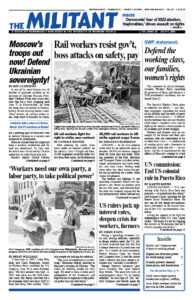Facing a spreading economic crisis and soaring inflation, especially in things workers need, the U.S. rulers have launched steps that will fuel a deeper downturn in production and jobs. In a model of understatement, Federal Reserve Chair Jay Powell told Congress June 22 that the central bank’s interest rate hikes meant a recession was “certainly a possibility.”
Former Treasury Secretary Lawrence Summers was more explicit than Powell. “We need five years of unemployment above 5% to contain inflation,” he said June 20. The “we” both Summers and Powell speak for is the relative handful of ruling capitalist families who own the plants, mines and mills, not working people.
Workers need to fight against any rise in unemployment. It would intensify competition for jobs, which the bosses will use to accelerate their assaults on wages and conditions.
Summers isn’t too optimistic about the future of capitalism either. At best, he says, it’s a return to what he calls “secular stagnation.” That doesn’t bode well for working people.
The coming slump comes on top of a 40-year-high inflation rate. Capitalist economists blame workers fighting for better wages for causing inflation. The Wall Street Journal’s James Mackintosh bemoans the number of strikes today and the potential for workers’ “empowerment.” “Stronger unions make for a more inflationary environment,” he claimed June 27.
Whenever workers and farmers face bouts of ruinous price rises, bosses blame those who are striking to defend their living standards. It’s not our wage demands, but the way the profit system works that leads to inflation.
The long-term decline in profit rates, which began in the 1970s, spurs bosses to cut investment on capacity-expanding production and equipment. Instead, they turn to speculation in search of profits. As competition for markets inevitably sharpens, capitalist producers press their governments to print more money, hoping to get a boost over their rivals.
When this happens, demand outstrips the production of goods and prices start to soar, devastating workers’ living standards, crippling younger workers’ ability to start and maintain a family, slashing the value of retirees’ savings and forcing more farmers off the land.
Under these conditions, workers are driven to fight for higher wages. “Uniting and winning higher wages only means a greater share of the wealth our labor produces goes to us, not into the pockets of bosses,” Joanne Kuniansky, Socialist Workers Party candidate for Congress from New Jersey, told the Militant. “It doesn’t force prices up, or push greater hardship onto the backs of other workers.”
SWP candidates around the country urge our unions to lead a fight for escalator clauses in every contract — and in all government programs like Social Security and SNAP food stamps — so that when prices rise, our wages and benefits go up automatically to match.
“To prevent the working class from getting torn apart by the coming capitalist downturn it is crucial that we fight for a shorter working week with no cut in take home pay, alongside an end to life-crushing overtime, and what many workers call ‘suicide’ or ‘divorce’ shift schedules that rip families apart,” Kuniansky said.
“Fighting for these measures can win workers some protection and strengthen our unions for bigger battles to come, as opposed to looking to capitalist politicians and government central bankers to tinker with interest rates.”
Workers face broad social crisis
The squeeze on working people is tightening on many fronts. New York City authorities imposed the sharpest rent rise in nearly a decade on over 2 million tenants who live in “rent-stabilized” apartments. Moving across the Hudson River provides no respite. Landlords in New Jersey have filed 40,600 eviction notices in the first half of this year.
Disastrous consequences of the capitalist crisis are being felt by working people worldwide. In the U.K. working people were hit with a 54% increase in household energy bills in April. Rail workers there are striking to defend living standards, and other unions are holding strike ballots.
For workers and farmers in the semicolonial world, the crisis is devastating. From Peru to Sri Lanka, Ecuador to Zimbabwe, toilers are protesting, demanding higher wages and action by governments to cut soaring prices.
In Harare, Zimbabwe, hundreds of nurses marched demanding higher wages at Parerenyatwa Hospital June 21. They rejected a government offer of a 100% raise, saying it didn’t come close to the inflation rate of 130%.
Protests took place in Burkina Faso, where in some provinces the price of corn and millet has risen by 122%. “As far as this cost of living that keeps increasing is concerned, we realized that the authorities have betrayed the people,” said Issaka Porgo, president of the coalition organizing the actions against the ruling military junta.
“Working people confront an international crisis,” Kuniansky said, “and we share interests in common with fellow working people worldwide. We need to organize together against the bosses and governments.”


